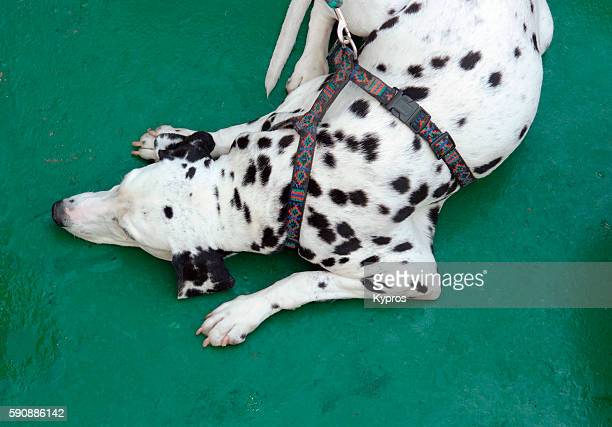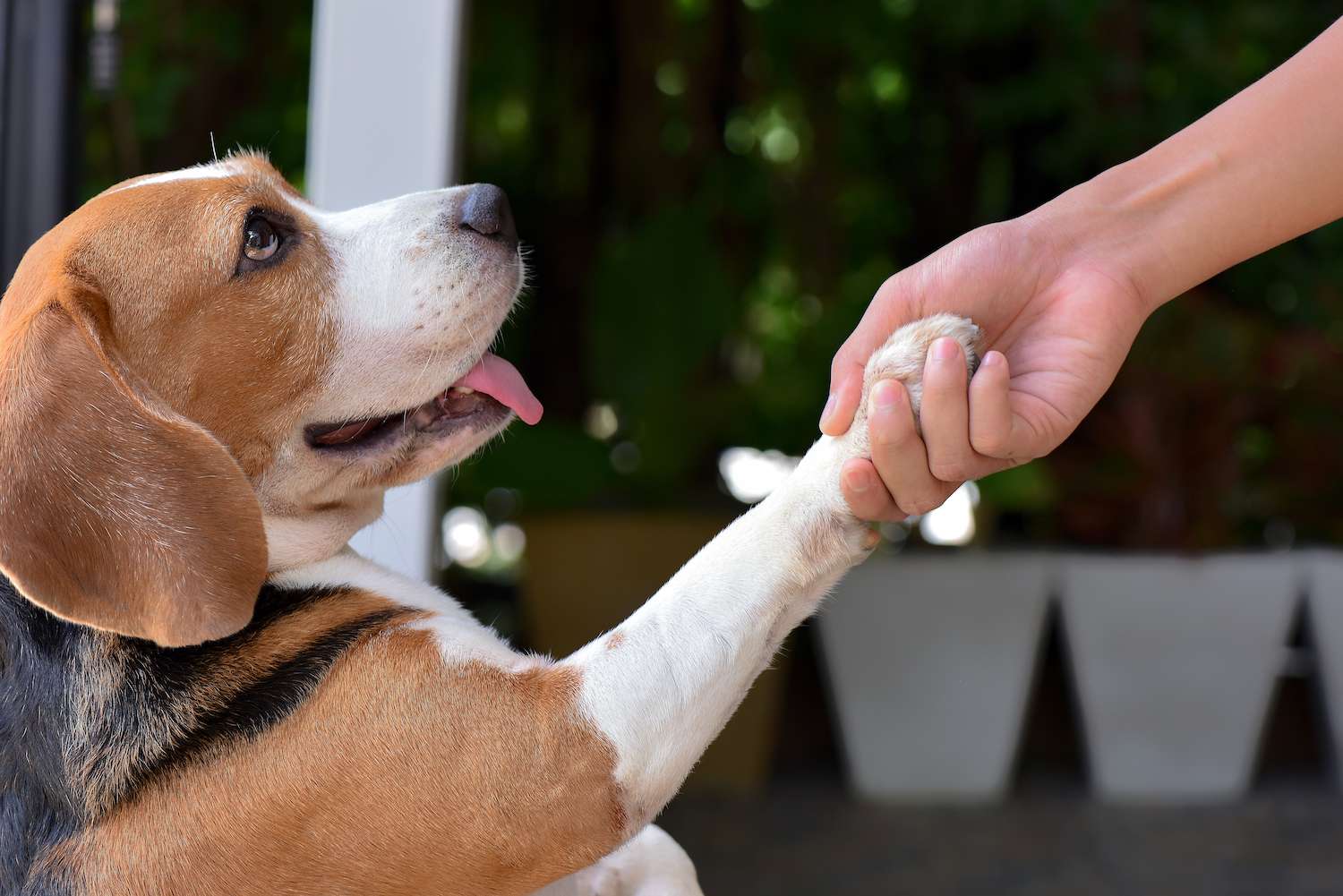
Many factors can make your dog restless at night. You can have your dog be restless nightly because of allergies, prednisone or Prednisone, as well as canine cognitive dysfunction. We will discuss what might be causing your dog to become restless at night and how we can help him sleep through it. We will discuss possible causes and treatment options for your dog's insomnia. Find out if your dog is suffering from a medical condition or an environmental problem that could cause restlessness.
Canine cognitive dysfunction can cause restlessness in dogs
Canine cognitive dysfunction is characterized by a dog that wanders at night and becomes restless. The symptoms of this condition may differ depending on the dog's cognitive abilities. Cognitive dysfunction means that dogs may not be able to greet their owners on the right cue or behave abnormally when they are petted. They might also be disinterested with their playmates and seem irritable. Their sleep-wake cycle may also become irregular. In some cases, dogs with cognitive dysfunction may also exhibit house soiling. This is often an indicator of brain damage.
While you cannot cure your dog's cognitive dysfunction, you can improve his quality of life with the right treatment. To control your dog’s behavior, medications or behavior modification may be an option. Your veterinarian might recommend behavior modification or medication to control your dog's behavior. Your dog may benefit from medication such as melatonin, recombinase or melatonin to reduce anxiety and restore normal sleeping patterns. Canine cognitive dysfunction is also characterized by urination in the home. Even if your canine was previously house-trained it can indicate cognitive dysfunction.
Medications that are effective for cognitive dysfunction include Selegiline (an agonist of monoamine oxidase), which is an inhibitor of the enzyme monoamine oxidase (MAO). This medication is approved by FDA and can be used to improve the sleep quality of dogs with this disorder. Other medications such vitamin E, melatonin and other medication can be used to help with restless behavior. Dietary supplements can be helpful for dogs suffering from cognitive dysfunction. Neutricks, a homeopathic treatment that is very effective, may also be an option. Traditional Chinese medicine is a form of traditional Chinese medicine. A vet may recommend herbal supplements or acupuncture.
Dogs that are given Prednisone may have restless nights.
Despite widespread use, side effects may occur in dogs when the drug is taken for long periods of time. Side effects include diarrhea and gastrointestinal upset, along with liver and joint problems. Your dog might also develop a canine snort and a poor hair-coat. Prednisone high doses can cause liver enzymes problems in dogs. These side effects can be avoided by slowly weaning your dog off prednisone.
Prednisone, in addition to making dogs restless at night, can also cause other side reactions such as excessive panting or thirst and an increase appetite. Talk to your vet if you notice any unusual behavior. If you believe your dog might be experiencing side effects from Prednisone it is vital to get your dog checked by a vet immediately.

As with any medication, prednisone comes with a dosage range. Your veterinarian will discuss your dog's specific circumstances and determine the most appropriate dose. Most veterinarians will give prednisone in moderate to high doses, which are then reduced gradually. It is essential that you and your veterinarian fully understand the treatment plan.
Dogs with allergies can have restless nights.
Your dog may have allergies and they can cause restless nights. It is important that you know that allergies most commonly start in dogs between six months to three years old. You may experience symptoms that vary according to season, and they may get worse if you move. There are many different ways to determine if your dog is suffering from allergies. Once your dog is diagnosed with allergy, you need to decide how you want to treat it.
Airborne particles, food, and environment can cause allergic reactions. Visit the vet if your dog has these symptoms. The vet will help you identify the allergen and recommend medications to ease the symptoms. A vet should be consulted if your dog experiences restless nights as a result of allergies. Allergies can cause severe discomfort and make it difficult for your dog to get enough rest.
Some medications may also cause your dog to have restless nights. Prednisone can cause restless nights. You may notice your dog's excessive thirst or panting. You may need to take your dog to the vet if he has a fever. The vet can diagnose if your dog's symptoms are due to allergies. No matter the reason, if your dog is still having restless nights, it's best to take him to the vet.
Pain can cause restlessness in dogs
It could be an indication of many conditions. Restlessness at night can be caused by arthritis, gastrointestinal upsets, skin disease, and toileting problems. Young dogs could also suffer from sleeplessness as a result of the same conditions. Talk to your vet to find out the reason for your dog's sleeping problems. Below are some options for treating your dog's discomfort.
Physical exams and tests are necessary for diagnosing pain in your dog, as well as to rule out other medical conditions. To rule out other reasons for restlessness in dogs, blood tests and urinalysis can be done at your vet. Treatment will depend on what is causing your dog's persistent restlessness. Some forms of therapy for canine dementia can cost as much as $350, so it's important to consult with your veterinarian immediately if you notice your dog becoming restless in the middle of the night.
In addition to pain, another cause of restlessness is stress. Restlessness in dogs can also be caused by excessive panting. Increased drooling or trembling are signs of anxiety. While restlessness can be caused by various conditions, anxiety can be the primary cause of anxiety in dogs. Lack of exercise or lack thereof can cause dogs to have excess energy that makes it difficult for them sleep at night.
Anxiety in dogs can lead to restlessness
It could be that your dog is acting out unusually, or even drooling. Your vet can diagnose the problem and suggest an appropriate treatment. Your vet can diagnose anxiety in dogs and recommend treatment. Dogs shouldn't be given over-the-counter anxiety medication. Some can even cause stomach problems. Self-diagnosis in anxiety can also cause problems. A vet will be able to help you diagnose and plan a treatment program for your dog's anxiety.

Fear of separation may be one reason dogs feel restless. Dogs can feel lonely if they are not with their pack, which can cause them to become destructive. Separation anxiety can lead dogs to bark and cause house-soiling. Separation anxiety symptoms can appear within 15 minutes. Dogs can become attached to their owners and develop over-attachment. You may notice restlessness in your dog, and signs such as excessive barking or house-soiling.
Dogs with separation anxiety tend to follow their owners around the house and show excessive enthusiasm for their owners when you leave. However, they may not exhibit any destructive behavior when they see you, and they may even show no signs of fear in front of you. Males often exhibit inappropriate elimination behavior. Excessive excitement during separation may indicate physical illness. It doesn't matter what cause it, treatment is key to your dog's well-being.
Age can cause restlessness in dogs
As your dog gets older, their behavior may change. This includes restlessness at night. Separation anxiety and anxiety in older pets can be increased as they lose their senses of smell, hearing and sight. Dogs with nighttime anxiety can also be caused by psychological and physical problems. Joint pains, arthritis and other conditions that impact mobility can all lead to physical changes. If your dog is experiencing increased restlessness at night, it's time to seek a veterinarian's advice.
Dogs that are restless may have symptoms all day. You can help relieve their discomfort by taking them outside in the evening to go for a toilet break. Older dogs may have reduced bladder function and become restless at night. If your dog is acting restless at night, you should take them to the bathroom. Consult a veterinarian if your dog doesn't show improvement within a few days. Your veterinarian will diagnose the problem and prescribe medications to ease the symptoms.
Age and changes in the environment are two of the most common causes for restless sleep in dogs. Restless sleeping can also occur due to excess energy and environmental changes. If your dog's restlessness persists for more than a few days, it is best to take him to the vet. It may become more severe if the restlessness doesn't improve. If this happens, it is possible to see a veterinarian. If you've tried these tips without any success, you'll soon see an improvement.
FAQ
What should I do if my pet dog bites someone?
You should first check that the animal you are being attacked is not rabid. If that is not possible, get help. Do not attempt to handle the situation yourself, as you could become seriously injured.
If the animal is not aggressive but does bite, then take it to a veterinary clinic. Your vet will inspect it and determine if further treatment is necessary.
In most cases, rabies shots are required. These should never be administered yourself. Only qualified people should perform this task.
How often should my dog be groomed?
It is essential to groom your dog. Grooming your dog is important to keep his coat clean and healthy.
Your dog needs to be brushed at least twice a week. After each meal, brush your dog.
Brushing your dog’s fur will get rid dirt and hair. Brushing your dog's teeth will make him look more healthy.
Ear infections can be prevented by brushing his ears.
How much money should I spend on a pet?
Budget between $200-$300 per calendar month.
This can vary depending on where one lives. In New York City for instance, the average monthly spending would be $350.
But, in rural areas, you may only need to spend about $100 per month.
It's important to remember that you should buy quality items such as a collar, leash, toys, etc.
Also, consider purchasing a pet crate. This will keep him safe during transport.
What are your considerations when choosing a pet to own?
Consider what lifestyle you want for your family and yourself. Do you have children? How many children do you have? How old are they now? Are there any special dietary requirements?
Are you concerned about allergies? Is there anything else you need to know about your pet?
Once you've answered these questions, think about whether you're looking for an active companion, a quiet lap dog, a house-trained cat, or perhaps a fish tank full of tropical fish.
If you are thinking about adopting a puppy, be sure to go to a shelter or rescue group to get to know them.
You'll also want to know if the animal has been vaccinated against rabies and other diseases.
Next, check with the owner to see if he/she will take care your animal while you're on vacation. This will make it so you don't have worry about leaving your pet home.
Keep in mind that pets are part and parcel of your family.
What are some signs that my pet might be sick?
Several symptoms indicate your dog is sick. You may notice the following symptoms:
-
Vomiting
-
Diarrhea
-
Lethargy
-
Fever
-
Weight loss
-
Reduced appetite
-
Coughing
-
Difficulty breathing
-
Bleeding around the nose
-
In stool or urine, blood can be found
These are just a handful of examples. Your vet will tell you what to be on the lookout for.
Statistics
- * Monthly costs are for a 1-year-old female mixed-breed dog and a male domestic shorthair cat less than a year old, respectively, in excellent health residing in Texas, with a $500 annual deductible, $5,000 annual benefit limit, and 90% reimbursement rate. (usnews.com)
- It's among a relatively few companies that provide policies with a full (100%) coverage option, meaning you are not responsible for any co-payment of bills. (money.com)
- In fact, according to ASPCA, first-year expenses can sum up to nearly $2,000. (petplay.com)
- Monthly costs are for a one-year-old female mixed-breed dog and an under one-year-old male domestic shorthair cat, respectively, in excellent health residing in Texas, with a $500 annual deductible, $5,000 annual benefit limit, and 90% reimbursement rate. (usnews.com)
- Here's a sobering reality: when you add up vaccinations, health exams, heartworm medications, litter, collars and leashes, food, and grooming, you can expect a bill of at least $1,000 a year, according to SSPCA. (bustle.com)
External Links
How To
How to train your dog
A pet dog is an animal companion that provides emotional support and companionship to its owner. It may provide protection against predators and protect other animals.
A pet dog must be trained by its owners to perform certain tasks such as fetching items, guarding against intruders, obeying commands, and performing tricks.
The typical training period lasts from six months to two and a half years. The owner teaches the dog basic obedience skills such as how to sit, lay down, stay, come on command, roll over, and walk on command. The owner also trains the dog to obey simple verbal commands and learns how to handle the dog's natural instincts.
Apart from teaching the basic behaviors to the dog, the owner should teach it to not bite other animals or people and to be respectful of strangers.